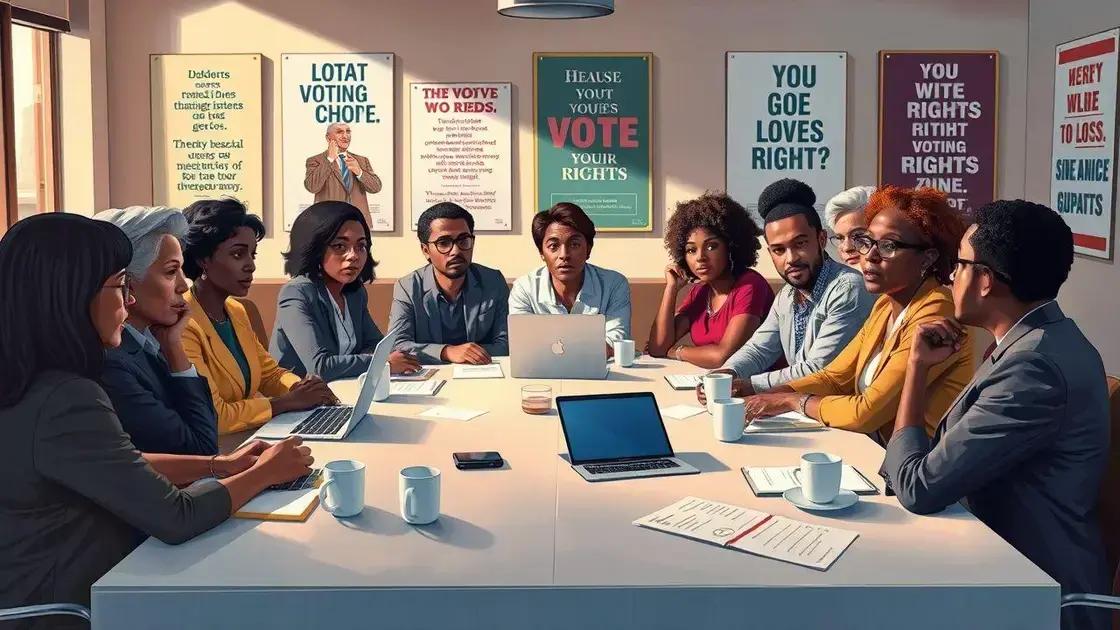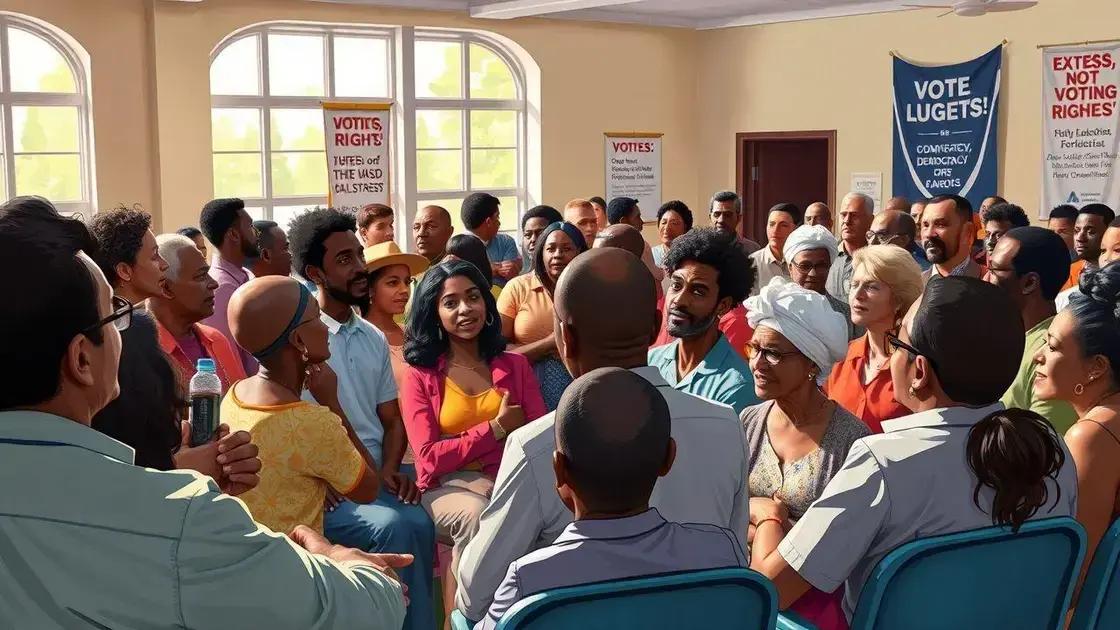Voting access legislation remains stalled: what’s next?

Anúncios
Voting access legislation remains stalled, preventing meaningful reforms that could enhance voter participation and ensure equitable access to the electoral process for all citizens.
Voting access legislation remains stalled, and this has significant implications for how we participate in democracy. As we navigate these complexities, have you thought about what this means for your voting rights?
Anúncios
The current state of voting access legislation
The **current state of voting access legislation** is marked by ongoing debates and challenges. Various states are pushing for changes, but the landscape remains uncertain. Understanding these developments is crucial for anyone concerned about their voting rights.
Recent Legislative Changes
Across the nation, numerous states have introduced or modified laws related to voting access. These changes can greatly impact how citizens engage with the electoral process. Some notable updates include:
Anúncios
- Extended voting hours
- Expansion of mail-in ballots
- Voter ID requirements
These elements illustrate a mixed approach, with some states making strides towards inclusivity while others impose stricter requirements.
Challenges to Voting Access
Despite advancements, several challenges persist. For instance, limited resources and misinformation continue to hinder voter participation. Moreover, certain laws remain controversial, prompting legal battles that affect the implementation of voting access.
Many organizations are actively working to counter these challenges. They aim to educate the public on their rights and ensure that voting access is protected. Engaging communities is vital for enhancing **voter turnout** and fostering an inclusive electoral environment.
Public Opinion on Voting Legislation
Public sentiment plays a significant role in the evolution of voting laws. Polls indicate a strong desire for accessible voting options, with many advocating for reforms.
- Majority support for same-day registration
- Concerns about long wait times at polling places
- Desire for transparent voting processes
This public pressure can shape the future of voting access legislation as lawmakers are increasingly responsive to their constituents’ needs.
Understanding the **current state of voting access legislation** reveals a complex and evolving landscape. As individuals engage with these issues, it’s clear that informed participation can lead to meaningful change.
Key stakeholders in the voting rights debate

Understanding the **key stakeholders in the voting rights debate** is essential for grasping the complexities involved. Various groups play significant roles, influencing legislation and public opinion. Their interests often intersect, creating a dynamic landscape.
Political Parties
Political parties are among the primary stakeholders in voting rights. Each party has different views on how voting should be structured. For instance, they may support:
- Voter ID laws
- Mail-in voting options
- Same-day registration
This variance in perspectives shapes laws that can affect voter access across the nation.
Civil Rights Organizations
Civil rights organizations advocate fiercely for equitable voting access. Their efforts often center on eliminating barriers that disenfranchise voters. Some notable groups include:
- The NAACP
- The American Civil Liberties Union (ACLU)
- The League of Women Voters
These organizations mobilize communities, educate citizens about their rights, and challenge restrictive laws in court. Their activism is vital in ensuring that all voices are heard.
In addition to political parties and civil rights groups, educational institutions also play a role. Schools and universities often promote civic engagement, teaching students the importance of voting. They help foster a newer generation of informed voters who understand their rights and responsibilities.
Businesses can also be key players in the debate. Some companies advocate for voting access, believing that a well-informed workforce benefits everyone in the community. They may push for policies supporting easy access to the polls.
Overall, the **key stakeholders in the voting rights debate** present a rich tapestry of perspectives and motivations. As the conversation continues, it’s essential to recognize how these various voices contribute to shaping the future of our electoral process.
Impact of stalled legislation on future elections
The impact of stalled legislation on future elections can be significant and far-reaching. When laws that aim to enhance voting access or reform the electoral process are delayed, the consequences can affect everyone involved in the democratic system.
Voter Participation
One major effect of stalled legislation is on voter participation. When voters are unsure about their rights, they may feel discouraged from going to the polls. This uncertainty can lead to:
- Decreased voter turnout
- Apathy towards election processes
- Lower engagement in civic activities
The lack of clear and accessible voting regulations can deter individuals from exercising their rights, which undermines the fundamental democratic principle of participation.
Effect on Elections
Stalled legislation also influences how elections are conducted. If laws that ensure fair voting practices are not passed, issues such as:
- Long lines at polling stations
- Inadequate resources for election administration
- Limited access to voting for underrepresented groups
become more prevalent. This can lead to a less equitable electoral process, which can harm the integrity of elections.
Moreover, political candidates may face challenges in communicating their platforms effectively. If voting rights remain uncertain, candidates might struggle to engage with potential voters, missing critical opportunities for outreach and support.
In addition to affecting voter participation and elections, stalled voting legislation can have broader implications for public trust in the electoral system. If citizens believe that their voices are not heard or that the system is rigged, they may lose faith in democracy itself. This could result in ongoing cycles of disillusionment and reduced turnout in the long term.
Understanding the impact of stalled legislation on future elections reveals serious issues that must be addressed. Ensuring timely reforms in voting access is crucial, as making progress is essential for a healthy democracy.
Public opinion on voting access reforms

Public opinion on voting access reforms plays a crucial role in shaping the dialogue around election laws. As citizens feel increasingly invested in their voting rights, understanding their perspectives becomes vital for lawmakers and advocates.
General Sentiment
Surveys indicate that many Americans support reforms aimed at making voting more accessible. This includes measures such as:
- Automatic voter registration
- Extended early voting periods
- Improved mail-in voting options
These reforms are often seen as essential for boosting participation and ensuring that everyone has the opportunity to vote without unnecessary obstacles.
Regional Variations
While there is broad support for voting access reforms, regional differences can influence public opinion. For example, citizens in urban areas may prioritize different reforms than those in rural communities. Factors affecting these differences include:
- Population density
- Access to polling places
- Local election laws
These unique challenges shape how individuals perceive the need for specific voting initiatives.
Additionally, public opinion can be swayed by current events and the media. When major legislative changes are proposed or publicized, people often become more engaged in discussing voting access. Issues such as unclear voting laws or recent legal battles can spark debates and influence how reforms are viewed.
Ultimately, as discussions around voting access reforms continue, public opinion remains a key factor. Advocacy groups must consider these perspectives to ensure their efforts align with the needs and desires of the communities they serve, making the democratic process stronger.
In conclusion, the state of voting access legislation is critical to the future of our democracy. Understanding the various stakeholders involved, the impact of stalled legislation, and public opinion on reforms highlights the complex nature of this issue. As we navigate these challenges, active participation in discussions about voting rights remains essential. Advocating for accessible voting can empower every citizen and strengthen the democratic process. Together, we can work towards a future where everyone can easily exercise their right to vote.
FAQ – Frequently Asked Questions about Voting Access Legislation
What is voting access legislation?
Voting access legislation includes laws and policies designed to ensure that every citizen can easily and fairly participate in elections.
Why is public opinion important for voting reforms?
Public opinion shapes what reforms are pursued and helps ensure that proposed laws reflect the needs and desires of the community.
How can stalled legislation affect voter turnout?
Stalled legislation can create uncertainty about voting rights, leading to lower participation rates as citizens may feel discouraged from voting.
Who are the key stakeholders in the voting rights debate?
Key stakeholders include political parties, civil rights organizations, and the public, all of whom influence discussions and decisions about voting access.





